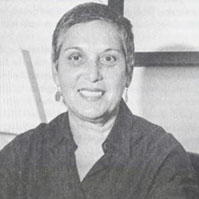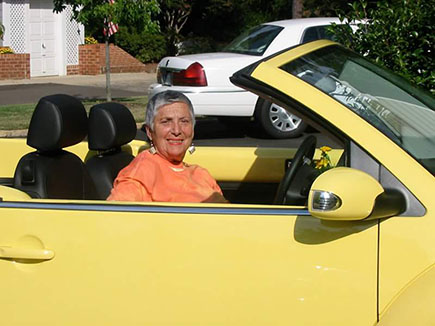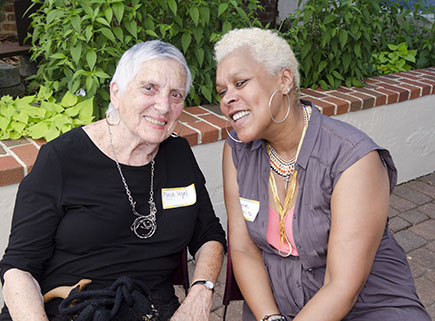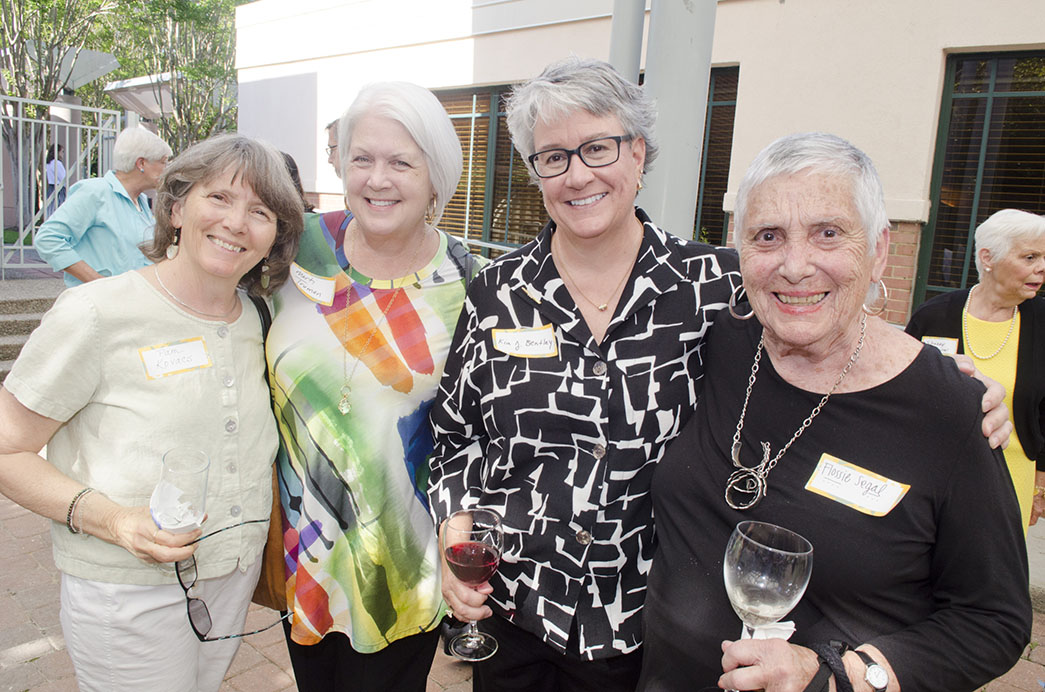'A LIGHT THAT CONTINUES TO SHINE'

Remembering the bright colors and light of Flossie Segal
For anyone who encountered Florence Z. “Flossie” Segal in her 99 years – and there were many – Gayle Harris might have said it best in what is an affirmation as much as a remembrance of the legendary faculty member who passed away in April.

“I love Flossie so much, and I say it in the present tense,” says Harris, daughter of former social work dean Grace E. Harris and a close friend of Flossie’s. “For me she’s still here. She’s a light that continues to shine.”
Flossie brought color and light everywhere she went – often in her bright yellow Volkswagen Beetle convertible. She loved jazz and fresh flowers from her garden. She and her husband, Jake, hosted pool parties, holiday celebrations and even wedding receptions at their Near West End home in Richmond. She had a sharp sense of humor.
She was a former associate professor of social work and director of continuing education at the school, and the sister of former dean Elaine Z. Rothenberg. Flossie helped co-found VCU’s Faculty Senate in 1970 and served as its second president, part of her tenure with the School of Social Work from 1968-1990.
‘Mother of Gateway’

Flossie co-founded Gateway Homes in Richmond in 1983 to provide residential mental health treatment for adults and remained on the board the rest of her life – even attending a clinical meeting about a month before her passing. She was known as the “Mother of Gateway.”
“She was active right up until the very end,” says Lynda Hyatt, Gateway chief executive officer. Hyatt started at Gateway as a clinical director and when she transitioned to the role of CEO a decade ago, she got to know Flossie on a more personal level.
“It was a relationship that first revolved around Gateway and then exceeded that in a lot of ways,” says Hyatt, who credits Flossie with securing a Housing and Urban Development grant that allowed Gateway to build its first residential building. “I have the original paperwork where she signed for that loan.”
Hyatt says Flossie’s deep commitment to a care facility like Gateway was “based on the fact that her daughter, Carol, was misdiagnosed with schizophrenia, when she was actually having early symptoms of multiple sclerosis, which sometimes mimics the symptoms. That experience spurred Flossie, because she did not want any other family to go through what she went through as far as how she was treated when people found out her daughter had been diagnosed with a mental illness.”
A colorful life

Gayle Harris’ relationship with Flossie started as a child. “She came to our family reunions, Flossie would be at our house Christmas morning,” Harris says. “We went on a family cruise together, and she and I were roommates,” Harris says. “My first impression of Flossie was that she and Jake were the coolest people on Earth. She was like my aunt.
“When I was a child, I loved orange, and she would always have something orange around to give me or something orange to wear. For her memorial service, I wore a really bright dress; Flossie wouldn't want me to wear black.”
Marcia Harrigan cherishes a baby quilt of boldly colorful numbers and letters that Flossie gave to her when her first child was born in 1977. “It has wrapped my two adult ‘kids’ and both of my grandchildren,” says Harrigan, a 31-year member of the school’s faculty and administration and a 1974 M.S.W. graduate. “They all know the special person who gave it to us. I am grateful for having known Flossie, with her wild stories, red lipstick and high heels – as well as her commitment to our profession.”
Harrigan relates that in the spring, shortly before Flossie’s passing, she found graded papers she wrote as a student in Flossie’s classes. “I regret forgetting to take them to our lunch to show Flossie, who had obviously read every word, made minor corrections, highlighted what she found important and raised questions about alternative ways to understand or question a situation.”
‘Taught us everything we know about sex’
Flossie was director of continuing education during a growth period for the school, helping establish four off-campus sites for students to study and earn their M.S.W. degrees – a precursor to the school’s successful online program format. She managed workshops for continuing education credits and training for public social service and child welfare workers, according to Bev Koerin, a 28-year faculty member and two-time graduate (M.S.W.’74; B.S.’69).
Koerin recalls meeting Flossie in the early 1960s when Koerin was about 15. Flossie hosted her when a group of Jewish teeangers traveled from Norfolk to Richmond for an event. “I remember being impressed with Flossie – her short haircut and stylish New York manner. I had never met a woman with a professional career in my youth, and I thought Flossie was super cool. She was one of a kind.”
Koerin and alum Sherry Peterson (M.S.W.’73) both recall Flossie teaching a human sexuality class, as well as one on emotional disorders.
“We laugh all the time and say that she taught us everything we know about sex because she and (faculty member) Lionel Lane taught the human sexuality class,” Peterson says. “Both my husband, Bill, who graduated the same year, and I and several of our friends were in that class, and so we used to laugh all the time about that.
“The thing about Flossie was, she was such an outgoing person that everybody knew her. It would be hard to find the student who didn't at least know who she was. She spoke to everybody. She really cared about people. When she asked how you were doing, she really wanted to know – she didn't do it just to make conversation.”

‘A grand lady’
Karl Netting met Flossie and Jake Segal in his role as chaplain at Bon Secours, when Jake was in the hospital. “They’re Jewish and I’m Christian, but she just welcomed me with open arms. We sort of bonded during that time,” he says.
They eventually discovered a social work link – F. Ellen Netting, Karl’s wife, is a former faculty member who worked at the school from 1993-2011, after Flossie’s tenure. “I actually met Flossie before Ellen did,” Karl Netting says. “All of us bonded and became friends.”
So much so that Karl Netting conducted the memorial services for both Flossie and Jake.
“The (funeral director) was absolutely blown away because he thought at Flossie’s age, there’d be very few people at that service, and it was jammed,” Netting says. “She just connected with people all across the community. She was a grand lady. Wonderful sense of humor.”
‘New York babe to Southern belle’
Koerin and Harrigan are part of a group of former women faculty, the Ladies Aid Society, who meet regularly and counted Flossie among their ranks. Long before the Academic Learning Commons opened, they called the Raleigh Building, at the corner of North Harrison and Franklin streets, their academic home.
“I can still see her coming into the Raleigh Building with flowers fresh cut from her home garden,” Harrigan says. “She always had them in her office during the summer and would share them with other colleagues she encountered.”
Koerin celebrated Flossie’s 95th birthday with a poem, “Too Cool for School,” she wrote and read when the ladies gathered:
From New York Babe to Southern Belle,
Having fun and living well.
We all met in the halls of Raleigh,
Shared in triumphs and some folly.
All along you’ve been so cool,
So say the Ladies from our School.
We wish you all good things today.
We’re glad to celebrate this way,
With food and wine and stories to share,
With hugs and kisses of love and care.